 Few things make my actressexual heart sing more than an actress taking the thinnest, most cliché-ridden kind of role and investing it with a charismatic, transcendent humanity. And this week offers one of the best examples of such actressing alchemy. Of course, I'm talking about the at once subtle and spectacular actressing performed by...
Few things make my actressexual heart sing more than an actress taking the thinnest, most cliché-ridden kind of role and investing it with a charismatic, transcendent humanity. And this week offers one of the best examples of such actressing alchemy. Of course, I'm talking about the at once subtle and spectacular actressing performed by...
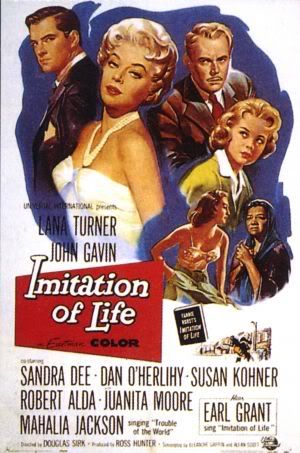
...Juanita Moore in The Imitation of Life (1959)
approximately 47 minutes and 14 seconds
42 scenes
roughly 38% of film's total running time
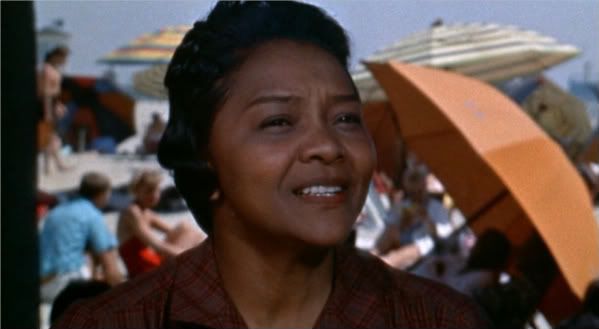 When we first meet her, Moore's Annie is spending the day at the beach with her daughter Sarah Jane. There, they meet Lora Meredith (Lana Turner in a fascinating, strange performance) and her daughter Susie. As the two single mothers chat, Annie offers to be Lora's live-in maid for free, a ridiculous proposal that accrues a poignant urgency when it becomes clear that Annie and Sarah Jane are, in effect, homeless. Moved by their plight, Turner's Lora -- in what will be become a life-transforming gesture -- invites Annie and Sarah Jane to stay with Lora and Susie in their coldwater Brooklyn flat.
When we first meet her, Moore's Annie is spending the day at the beach with her daughter Sarah Jane. There, they meet Lora Meredith (Lana Turner in a fascinating, strange performance) and her daughter Susie. As the two single mothers chat, Annie offers to be Lora's live-in maid for free, a ridiculous proposal that accrues a poignant urgency when it becomes clear that Annie and Sarah Jane are, in effect, homeless. Moved by their plight, Turner's Lora -- in what will be become a life-transforming gesture -- invites Annie and Sarah Jane to stay with Lora and Susie in their coldwater Brooklyn flat.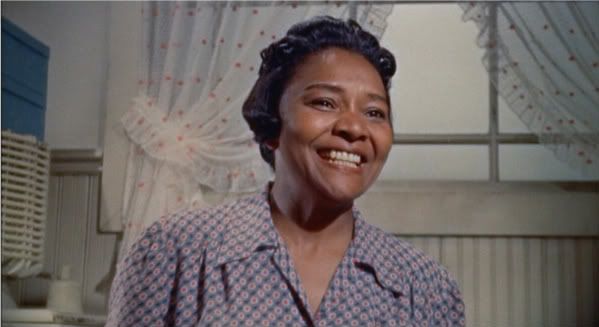 Moore's Annie wastes little time making herself indispensable to Lora. She cooks, cleans, babysits, even fends of debt-collectors. Moore's Annie thus quickly establishes herself as a necessary presence in Lora's life at the precise moment when Lora's career (she's a model/actress) starts to take off.
Moore's Annie wastes little time making herself indispensable to Lora. She cooks, cleans, babysits, even fends of debt-collectors. Moore's Annie thus quickly establishes herself as a necessary presence in Lora's life at the precise moment when Lora's career (she's a model/actress) starts to take off.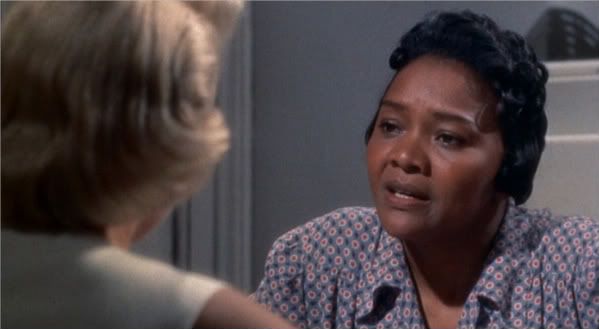 Moore's Annie does all of this work, in exchange only for room and board, ostensibly to provide greater happiness and opportunity for her fair-skinned but dark-tempered daughter, Sarah Jane. Indeed, in many ways, the role asks that Annie be the embodiment of "mother love" and Moore's performance develops this affect in all kinds of ways. Even Annie's infectious buoyancy of personal spirit only deflates when she worries about Sarah Jane's troubles, especially her daughter's self-loathing of her (and her mother's) blackness. This is not to say that Moore's Annie is merely an idealized type, a perfectly selfless "Mammy" who's also an ideally sacrificing "Mother." Juanita Moore does develop Annie according to such ideals, as the script demands, but Moore (in clear collaboration with director Douglas Sirk) also layer such ideals with human complexity. A passionately Christian woman, Annie measures herself according to the impossibly high standards of such ideals and, in Moore's performance, we see the personal costs of such self-sacrifice.
Moore's Annie does all of this work, in exchange only for room and board, ostensibly to provide greater happiness and opportunity for her fair-skinned but dark-tempered daughter, Sarah Jane. Indeed, in many ways, the role asks that Annie be the embodiment of "mother love" and Moore's performance develops this affect in all kinds of ways. Even Annie's infectious buoyancy of personal spirit only deflates when she worries about Sarah Jane's troubles, especially her daughter's self-loathing of her (and her mother's) blackness. This is not to say that Moore's Annie is merely an idealized type, a perfectly selfless "Mammy" who's also an ideally sacrificing "Mother." Juanita Moore does develop Annie according to such ideals, as the script demands, but Moore (in clear collaboration with director Douglas Sirk) also layer such ideals with human complexity. A passionately Christian woman, Annie measures herself according to the impossibly high standards of such ideals and, in Moore's performance, we see the personal costs of such self-sacrifice.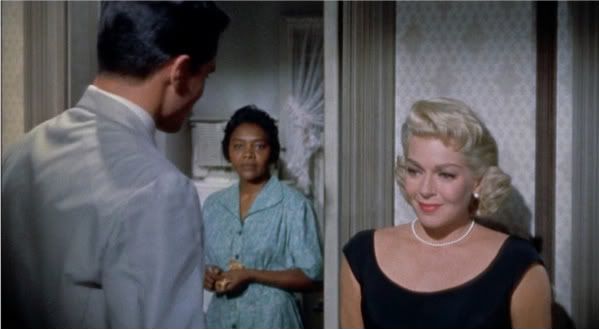 (My favorite moment in Moore's performance comes after she and John Gavin's Steve have spent the evening together addressing envelopes. Turner's Lora arrives home and Gavin's Steve turns his attention wholly toward her. In a brief flash, clearly staged by Sirk, Moore registers Annie's sad resignation that the pleasure of Steve's attentive company is not hers to claim. It's a startling, vivid yet subtle glimpse into Annie's personhood -- one that is quietly echoed throughout Moore's characterization.)
(My favorite moment in Moore's performance comes after she and John Gavin's Steve have spent the evening together addressing envelopes. Turner's Lora arrives home and Gavin's Steve turns his attention wholly toward her. In a brief flash, clearly staged by Sirk, Moore registers Annie's sad resignation that the pleasure of Steve's attentive company is not hers to claim. It's a startling, vivid yet subtle glimpse into Annie's personhood -- one that is quietly echoed throughout Moore's characterization.)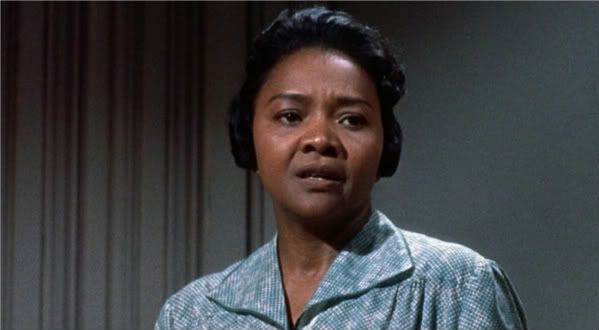 But the thrust of Annie's arc comes from the challenges she faces with her daughter, Sarah Jane.
But the thrust of Annie's arc comes from the challenges she faces with her daughter, Sarah Jane.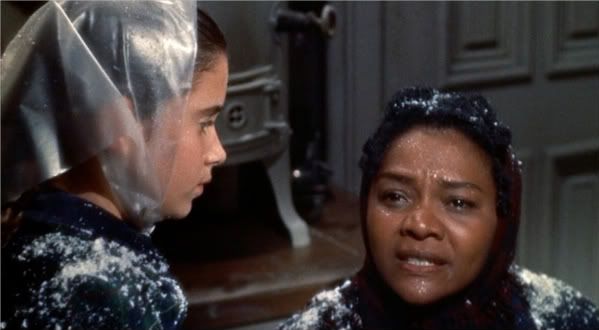 The driving narrative conceit of The Imitation of Life derives from the fact that Sarah Jane is light enough to "pass" for white. Moreover, Sarah Jane craves the privileges and opportunites that accrue to whiteness and, even as a child, bitterly resents being denied those privileges by her mother (who insists both that her daughter remain truthful about who she is and that there is pride in being black). Sarah Jane's troubles, then, impel the various narrative threads exploring (through the fraught lens of mother daughter relationships) how much one should live for oneself and how much one should live for one's mother/daughter.
The driving narrative conceit of The Imitation of Life derives from the fact that Sarah Jane is light enough to "pass" for white. Moreover, Sarah Jane craves the privileges and opportunites that accrue to whiteness and, even as a child, bitterly resents being denied those privileges by her mother (who insists both that her daughter remain truthful about who she is and that there is pride in being black). Sarah Jane's troubles, then, impel the various narrative threads exploring (through the fraught lens of mother daughter relationships) how much one should live for oneself and how much one should live for one's mother/daughter.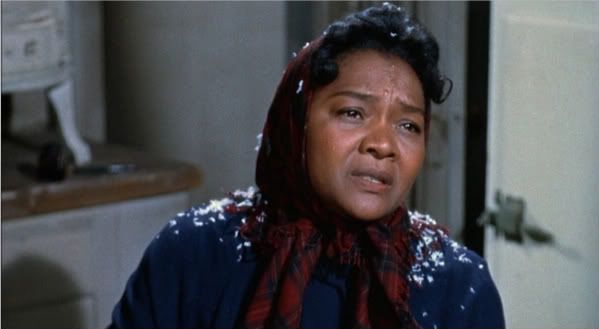 Annie lives for Sarah Jane (and for Susie, for Lora, and for many others too) and it's her story of selfless sacrifice that anchors the film.
Annie lives for Sarah Jane (and for Susie, for Lora, and for many others too) and it's her story of selfless sacrifice that anchors the film.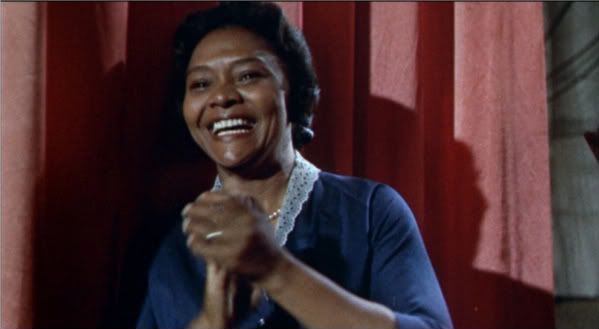 Moore's tasks in the film veer from exuberant support to silent suffering.
Moore's tasks in the film veer from exuberant support to silent suffering.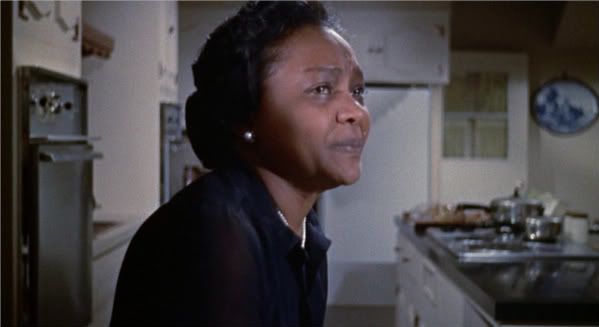 Juanita Moore scores the emotional steps between such polarities carefully, always demonstrating Annie's ability to be of service to pretty much everyone without ever obscuring her defining commitment to the one thing that truly matters: cultivating her daughter Sarah Jane's pride in who she is.
Juanita Moore scores the emotional steps between such polarities carefully, always demonstrating Annie's ability to be of service to pretty much everyone without ever obscuring her defining commitment to the one thing that truly matters: cultivating her daughter Sarah Jane's pride in who she is.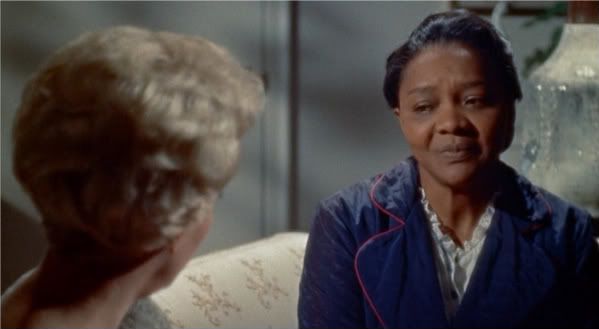 In the second half of the narrative -- when Lora's a successful actress, when Susie's a sweet but sad teenager, and when Sarah Jane's an incorrigibly rebellious bad seed -- Annie remains as Annie has always been...just more tired. (Of course, Annie's exhaustion becomes ominous code for "she's gonna die" which ends up amplifying the urgency of her subsequent scenes.)
In the second half of the narrative -- when Lora's a successful actress, when Susie's a sweet but sad teenager, and when Sarah Jane's an incorrigibly rebellious bad seed -- Annie remains as Annie has always been...just more tired. (Of course, Annie's exhaustion becomes ominous code for "she's gonna die" which ends up amplifying the urgency of her subsequent scenes.)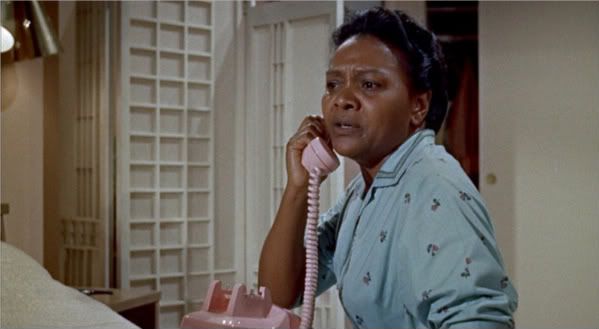 When Annie discovers that Sarah Jane has been lying about her "late shift" at the library, she also learns that not only has Sarah Jane taken a trashy "showgirl" gig but she has "passed" as white to do so. In the scene that follows, Moore charts the range of emotions that define Annie's character arc, beginning with her maternal fury at her child's inappropriate behavior...
When Annie discovers that Sarah Jane has been lying about her "late shift" at the library, she also learns that not only has Sarah Jane taken a trashy "showgirl" gig but she has "passed" as white to do so. In the scene that follows, Moore charts the range of emotions that define Annie's character arc, beginning with her maternal fury at her child's inappropriate behavior...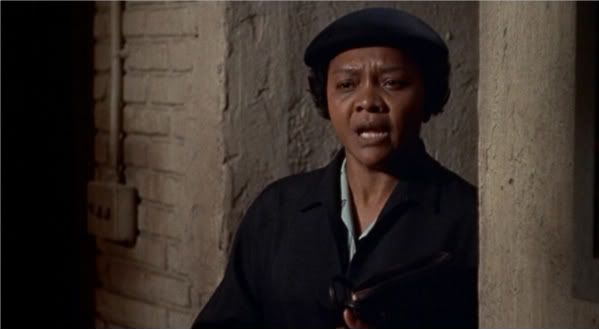 which shifts to a desperate concern that she might lose her daughter...
which shifts to a desperate concern that she might lose her daughter...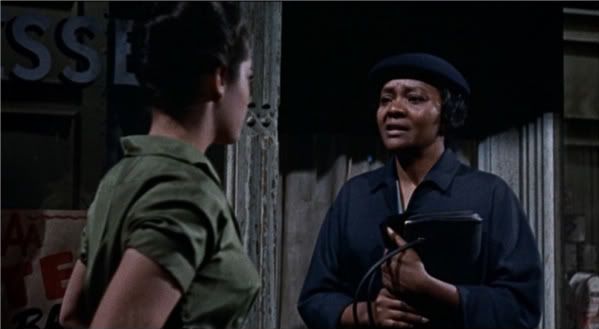 that culminates in the devastating pain of the seemingly irreconcilable -- or incurable -- differences that separate them.
that culminates in the devastating pain of the seemingly irreconcilable -- or incurable -- differences that separate them.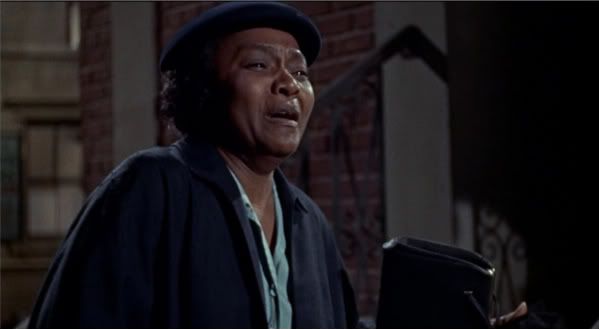 A less emotionally decadent director might have left it at with the daughter leaving as the ill mother collapses on the street. But Sirk takes things one additional level and, in so doing, collaborates with Juanita Moore to configure one more heart-stomping confrontation between Annie and Sarah Jane.
A less emotionally decadent director might have left it at with the daughter leaving as the ill mother collapses on the street. But Sirk takes things one additional level and, in so doing, collaborates with Juanita Moore to configure one more heart-stomping confrontation between Annie and Sarah Jane.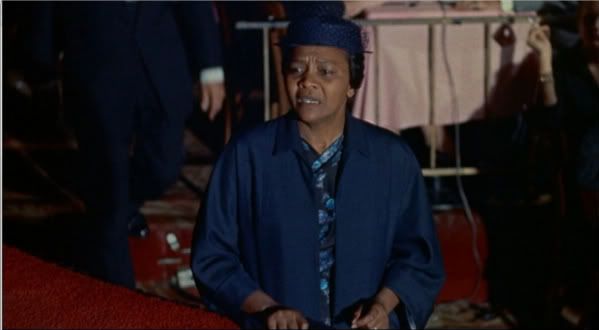 Having pursued Sarah Jane across the country to Los Angeles, Moore's Annie is nonetheless mortified to see her daughter again passing for white and dancing in a nightclub.
Having pursued Sarah Jane across the country to Los Angeles, Moore's Annie is nonetheless mortified to see her daughter again passing for white and dancing in a nightclub.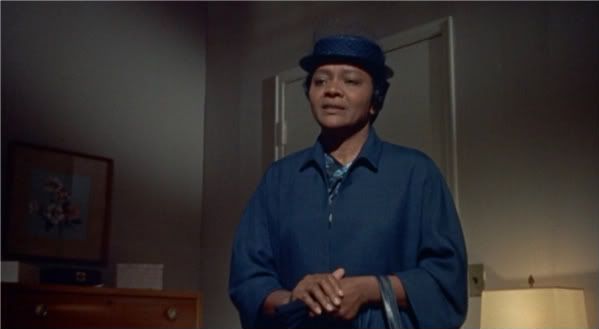 She follows Sarah Jane to her rented room and insists that they speak.
She follows Sarah Jane to her rented room and insists that they speak.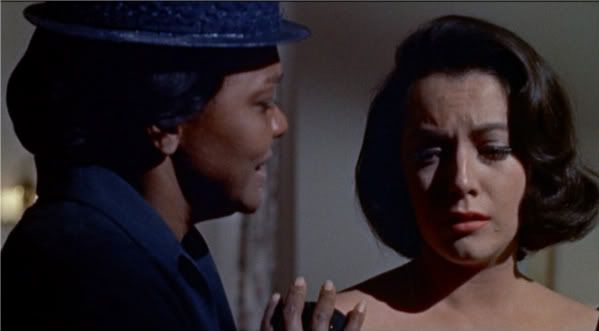 In this scene, Moore's Annie expresses her love for her daughter while affirming that she will do nothing to interfere with Sarah Jane's happiness, even going so far as to deny that she's Sarah Jane's mother. It's a brilliantly executed, emotionally shocking sequence -- anchored by the potent synergy between director and performer.
In this scene, Moore's Annie expresses her love for her daughter while affirming that she will do nothing to interfere with Sarah Jane's happiness, even going so far as to deny that she's Sarah Jane's mother. It's a brilliantly executed, emotionally shocking sequence -- anchored by the potent synergy between director and performer.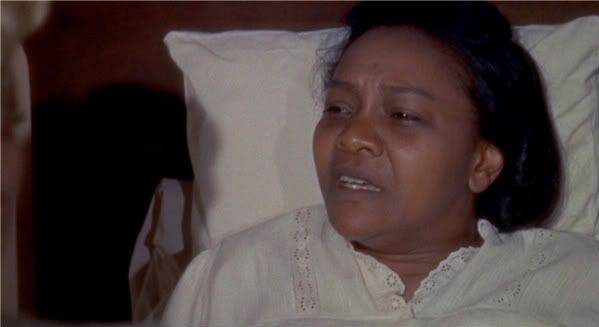 Then Moore's Annie goes home to die (but not before helping to rescue the mother-daughter connection between Lora and Susie and delivering an extended deathbed scene that would be hilarious if it weren't so so tenderly sad).
Then Moore's Annie goes home to die (but not before helping to rescue the mother-daughter connection between Lora and Susie and delivering an extended deathbed scene that would be hilarious if it weren't so so tenderly sad).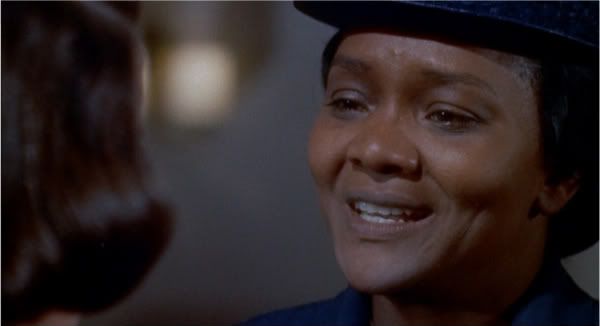 Moore inhabits this most familiar stock character -- the perfect "mammy" who's also the idealized "mommy" -- with an elevating, precise humanity. Throughout this remarkable film, Juanita Moore deftly adds resonant character details (that look at Steve, the blazingly ironic line "You never asked") to deliver a lucid, thoughtful and emotionally pungent performance. A radiantly humanizing characterization of a potentially negligible role.
Moore inhabits this most familiar stock character -- the perfect "mammy" who's also the idealized "mommy" -- with an elevating, precise humanity. Throughout this remarkable film, Juanita Moore deftly adds resonant character details (that look at Steve, the blazingly ironic line "You never asked") to deliver a lucid, thoughtful and emotionally pungent performance. A radiantly humanizing characterization of a potentially negligible role.

11 comments:
Lovely write-up, but I thought she underplayed TOO much, blunting the overall impact of her character arc. In fact, the only performance in this film that I really liked and would personally nominate was Sandra Dee's, who showed surprising depth and in the "You're acting!" scene, pretty much blew Lana Turner (terrible!) off the screen. I'm not a huge fan of Sirk, so that might have something to do with my inability to really appreciate his performances - this kind of overwroughtness and emotional indulgence isn't really my cup of tea.
I, too, thought Sandra Dee was quite good.
"her fair-skinned but dark-tempered daughter, Sarah Jane"
very well put :D
I can't wait to see this again next week. I remember loving this performance, though it's not an easy film to watch.
A photo of Juanita Moore & Susan Kohner made in 2008. I don't know if you've seen it. :D nice to see some of these actresses still living.
http://www.afrocentricnews.com/html/juanita_moore_susan_kohner.html
will you be doing Room at the Top next week? :) now, that's a discussion.
the link doesn't fit :(
http://www.afrocentricnews.com
/html/juanita_moore_susan_kohner.html
One quick thought about scale:
Addressing the question of whether Moore "underplayed" her performance might register differently depending on how the film is screened. I first watched the film on our fairly giant HD widescreen teevee, but timed it on a smaller one. Moore's performance definitely saw the benefit of the larger screen (which, arguably, is closer to what was planned).
Great flick! Very emotional.
reelartsy.blogspot.com
My TV was pretty big, so I think its more of a matter of the performance's initial impression on me. I'd watch the film again but I dunno if I'd make it through...
Her and her daughter's story is the whole point of the movie. I felt like Lana's was in there for star power and fashion to make you watch it. Loved this performance.
My mother and I always phone each other up whenever this is on to alert the other to TURN THE TV ON, IMITATION OF LIFE IS ON...
This is a wonderful piece! Annie is just fantastic, one of the best film moms ever.
We can't fault Sarah Jane for her feelings. Isn't what she wanted is what we all as black people wanted (and still striving for)? To be treated as equals, and not have to be in the back!
Am I the only one who thought Lana Turner was simply playing herself? She was a horrible mother in real life, and a horrible mother in this film... not to mention how often we have to see her stick her conceited nose up in the air in this movie.
Steve should have married Suzy, then he could have married a real human being, instead of a case study in Narcissistic Personality Disorder (Lora).
I kept wanting Steve to grab Suzy and Annie, and take them far away from that woman's house, and her destruction...
Post a Comment